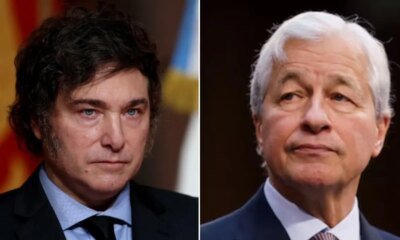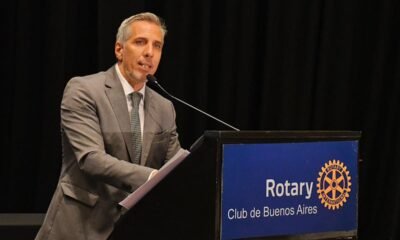INTERNACIONAL
SCOOP: House GOP memo highlights Republican wins in Trump’s ‘big, beautiful bill’

FIRST ON FOX: An internal House GOP memo sent to Republican lawmakers and obtained by Fox News Digital highlights the party’s key accomplishments included in President Donald Trump’s «big, beautiful bill.»
House Republicans passed all 1,118 pages of Trump’s «one big, beautiful bill» on Thursday morning, after working through hourslong committee meetings, last-minute huddles in the speaker’s office and even a last-minute push from the president.
Finally, late Wednesday night, House leadership found consensus among key factions of the Republican caucus. The late-night «manager’s amendment» appeased lingering Republican holdouts, including fiscal hawks who wanted more reform on Medicaid and former President Joe Biden’s green energy subsidies, and blue state Republicans seeking to raise the cap on the state and local tax (SALT) deduction.
The bill is a sweeping multitrillion-dollar piece of legislation that advances Trump’s agenda on taxes, immigration, energy, defense and the national debt. It aims to slash the federal government’s spending trajectory by cutting roughly $1.5 trillion in government spending. The U.S. government is over $36 trillion in debt and has spent $1.05 trillion more than it has collected in the 2025 fiscal year, according to the Treasury Department.
The bill raises the debt ceiling by $4 trillion.
MIKE JOHNSON, DONALD TRUMP GET ‘BIG, ‘BEAUTIFUL’ WIN AS BUDGET PASSES HOUSE
House Speaker Mike Johnson, center, celebrated passing President Donald Trump’s «big, beautiful bill» on Thursday. (Photo by Andrew Harnik/Getty Images)
The internal House Republican memo shared with Fox News Digital summarizes Republicans’ key legislative accomplishments.
According to the memo, the bill reduces the deficit by $238 billion through the Agriculture Committee, securing $294 billion through Supplemental Nutrition Assistance Program (SNAP) benefit reform. It reinvests $56 billion in SNAP benefit savings into rural America.
HOUSE GOP LEADERSHIP TAKES VICTORY LAP AFTER PASSING TRUMP’S ‘ONE BIG, BEAUTIFUL BILL’
Republicans say the SNAP reform restores its integrity by requiring states to pay a larger share for its benefits and incentivizing more state efficiency. It requires congressional approval for states to increase enrollment eligibility and creates SNAP work requirements for able-bodied adults who do not have young dependents.
The Armed Services Committee increased defense spending by nearly $143 billion with improvements to service members’ quality of life, healthcare and family support. There are billions of dollars allocated to building the military’s arsenal, advancing technology and infrastructure and expanding military readiness.
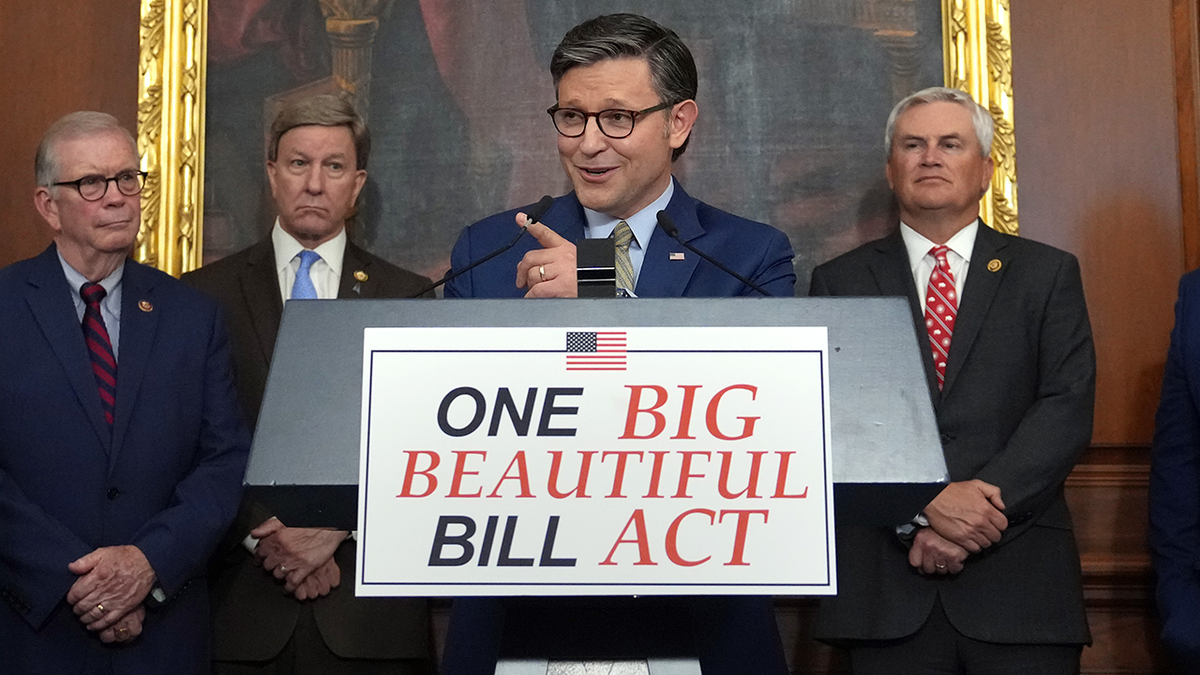
House Speaker Mike Johnson, center, and House Republicans celebrated passing President Donald Trump’s «big, beautiful bill» on Thursday. (Getty Images)
The bill allocates $34 billion for shipbuilding, $5 billion for border security enforcement, $400 million for the Department of Defense and $25 billion for Trump’s Golden Dome, which is a layered missile defense shield.
It reduces the deficit by $349.1 billion through the Education and Workforce Committee, which made a series of reforms to streamline student loan payment options, support students and save taxpayer money.
Specifically, the bill caps the total amount of federal student aid a student can receive annually to the median cost of the college, which is $50,000 for undergrad, $100,000 for graduate students and $150,000 for professional graduate programs. There is also a «lifetime limit» of $200,000.
The Education and Workforce Committee consolidated student loans into two plans – a fixed mortgage-style plan or a repayment assistance plan.
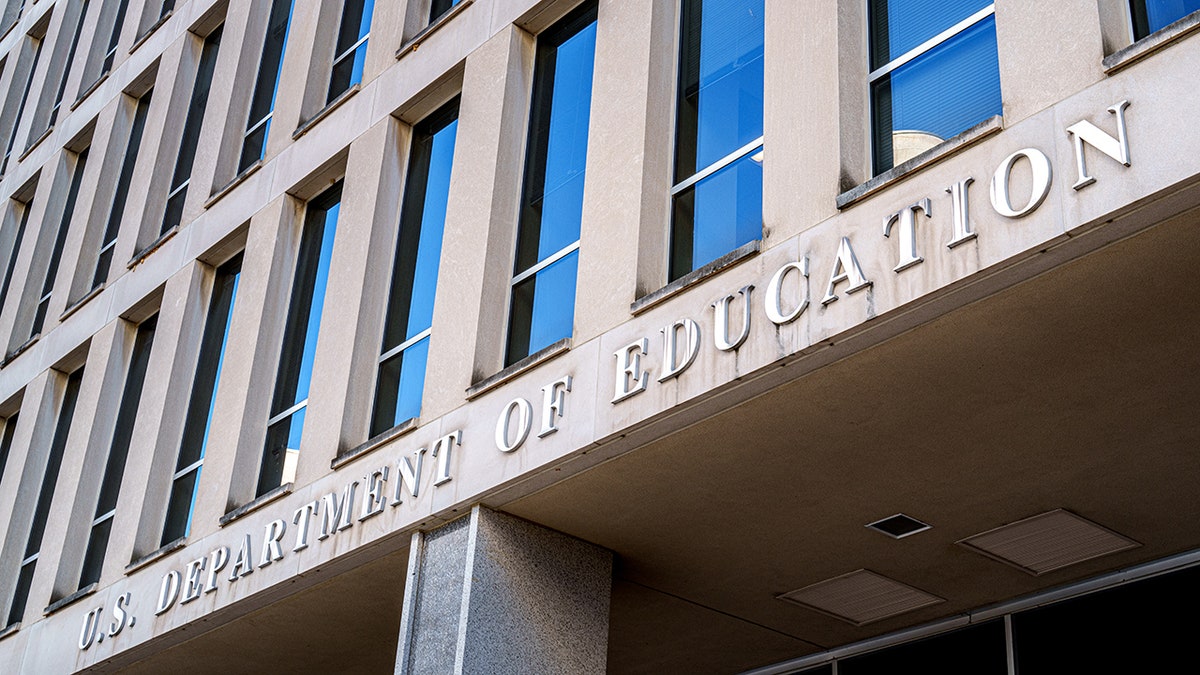
The U.S. Department of Education headquarters building in Washington, D.C. (J. David Ake/Getty Images)
It also establishes a performance-based PROMISE grant program, prevents future attempts at the loan forgiveness program championed by the Biden administration and reforms Pell Grant programs.
The Energy and Commerce Committee, which had a lengthy overnight budget markup last week, includes a series of Medicaid reforms, which Democrats have railed against as conservatives pushed for more cuts. The bill establishes work requirements for able-bodied adults without dependents, requires state cost-sharing for adults above the poverty line, eliminates illegal immigrants from enrolling and reduces state funding for states who prioritize coverage for illegal immigrants.
The Financial Services Committee in the «big, beautiful bill» includes reforms to save taxpayer money and reduce federal bureaucracy. Meanwhile, the Homeland Security Committee increases spending by a little over $79 billion to expand border security, and the Judiciary Committee increases spending by about $7 billion to stop illegal immigration.
The Energy and Commerce Committee also delivered on one of Trump’s key campaign promises to unleash American energy by supporting domestic energy production and eliminating Biden-era green energy projects, including eliminating electric vehicle mandates.
DEMOCRATS PREDICT PASSING TRUMP’S ‘BIG, BEAUTIFUL BILL’ WILL COST MANY REPUBLICANS THEIR SEATS
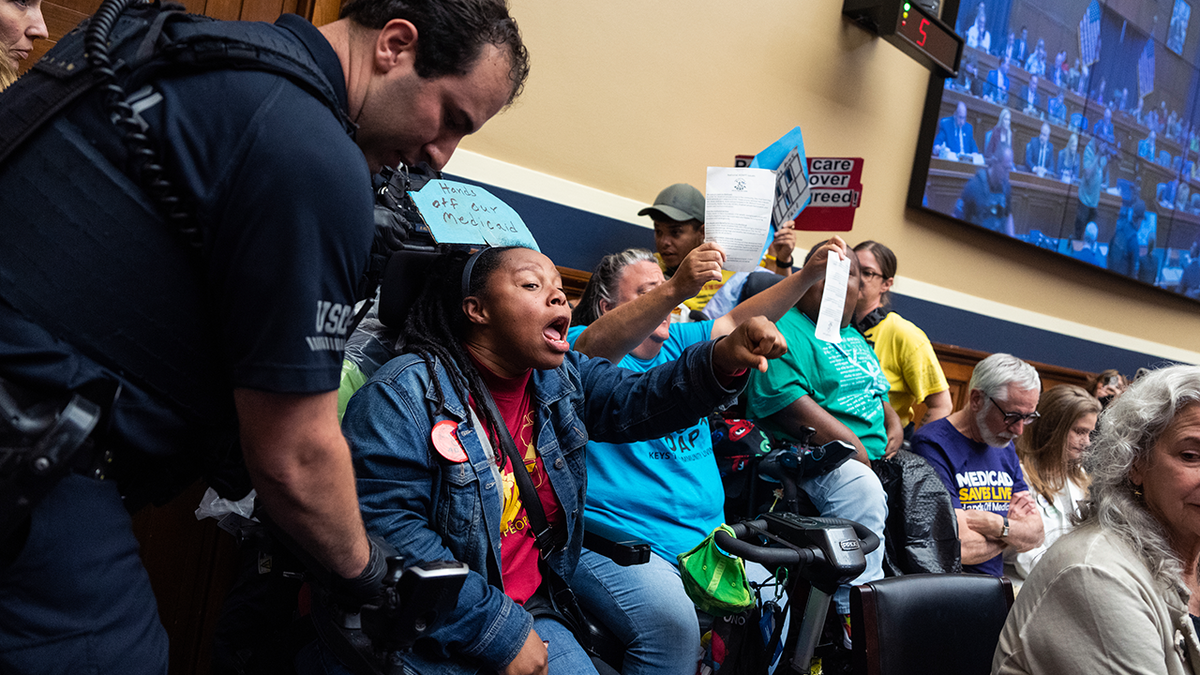
Demonstrators calling for the preservation of Medicaid funding are removed from the House Energy and Commerce markup of the FY2025 budget resolution in the Rayburn building on Tuesday, May 13, 2025. (Tom Williams/CQ-Roll Call, Inc via Getty Images)
The Natural Resources Committee reduces the deficit by $18 billion to deliver Trump’s energy agenda. The bill reinstates quarterly onshore oil and gas lease sales, requires geothermal lease sales and mandates at least 30 lease sales in the newly-renamed Gulf of America over the next 15 years and six in the Cook Inlet in south-central Alaska.
It returns oil and natural gas royalty rates to before Biden’s Inflation Reduction Act, resumes leases on energy production in the National Petroleum Reserve in Alaska and the Arctic National Wildlife Refuge, resumes coal leasing on federal lands, increases timber sales and long-term contracts on federal lands and walks back funds allocated by the Biden administration for climate change.
The bill includes amendments by the Oversight Committee that will reduce the deficit by $12 billion by eliminating retirement annuity payments for new federal retirees that are eligible to retire before age 62, allows new federal employee hires the option to elect to serve «at will» in exchange for higher take-home pay, requires a comprehensive audit of employee dependents currently enrolled in the Federal Employees Health Benefits Program plans.
TRUMP’S ‘BIG, BEAUTIFUL BILL’ PASSES KEY HOUSE HURDLE AFTER GOP REBEL MUTINY
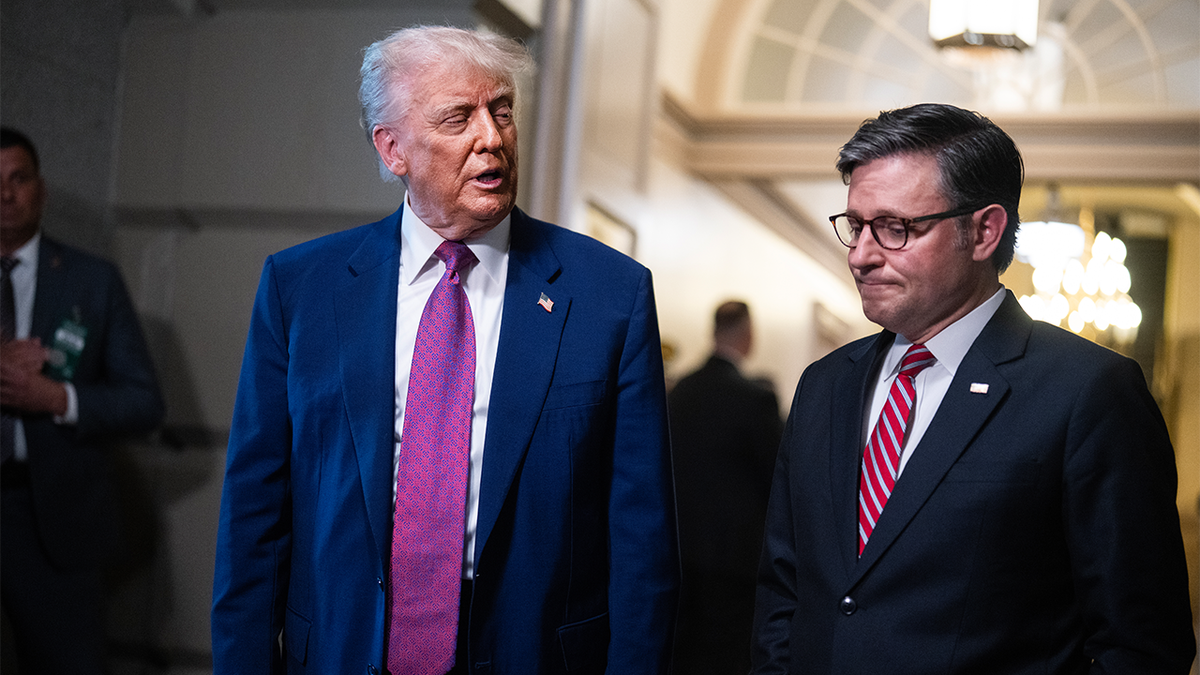
President Donald Trump, left, and Speaker of the House Mike Johnson, R-La., talk with reporters after a House Republican Conference meeting on the budget reconciliation bill in the U.S. Capitol on Tuesday, May 20, 2025. (Tom Williams/CQ-Roll Call, Inc via Getty Images)
Finally, the Ways and Means Committee makes the 2017 tax cuts permanent, which prevents a 22% tax hike, and delivers Trump’s campaign promises, including no taxes on tips, overtime pay or car loan interests. It also provides additional tax relief for seniors. The bill increases the university endowment tax and subjects the largest endowments to the corporate tax rate.
As touted in the House GOP memo, the bill also prevents taxpayer benefits from going to illegal immigrants by requiring a Social Security number for individuals claiming tax credits and deductions, ends illegal immigrant eligibility for Obamacare premium tax credits and Medicare, and applies new remittance payment fees for illegal immigrants.
CLICK HERE TO GET THE FOX NEWS APP
The One Big Beautiful Bill Act passed in the U.S. House of Representatives 215 to 214. All Democrats and just two Republicans, Reps. Thomas Massie, R-Ky., and Warren Davidson, R-Ohio, voted against it. House Freedom Caucus Chair Andy Harris, R-Md., voted «present.»
Now, the Senate is tasked with passing their own version of the bill before it lands on Trump’s desk. Republican leadership is eyeing a July 4 deadline, but sparks are likely to fly in the Senate before Trump can claim a legislative victory.
Politics,House Of Representatives,Republicans
INTERNACIONAL
Scandal-plagued Virginia AG hopeful’s wife reportedly donated to fund that freed accused criminals, murderers

NEWYou can now listen to Fox News articles!
Virginia attorney general candidate Jay Jones faced new political fallout Friday after a report revealed his wife had donated to the Minnesota Freedom Fund, a controversial bail organization that used millions to spring violent offenders, including accused rapists and murderers, from jail.
In May 2020, during unrest in Minneapolis after George Floyd’s death, Mavis Jones posted on Twitter: «I just donated to the Minnesota Freedom Fund,» linking to the group’s donation page and urging others to do the same. The account has since gone private.
The revelation, first reported by The Washington Free Beacon, comes as Jones, a Democrat, trails Republican incumbent Jason Miyares in a tightening race for Virginia’s top law enforcement post. The state’s attorney general oversees state-level prosecutions and police oversight.
JAY JONES TEXT SCANDAL SPARKS DONATION SURGE AS GOP GROUP POURS MILLIONS MORE INTO VA RACE
The Minnesota Freedom Fund, promoted at the time by several progressive figures, including Sen. Kamala Harris, raised more than $41 million during the 2020 protests, pledging to support demonstrators arrested during clashes with police.
But a FOX 9 investigation later found the group spent most of its money bailing out defendants accused of serious violent crimes rather than low-level protest offenses.
Jay Jones addresses supporters after winning the Democratic nomination for Virginia attorney general as wife Mavis Jones looks on in Norfolk, Va., June 17, 2025. (Trevor Metcalfe/The Virginian-Pilot/Tribune News Service via Getty Images)
Among those bailed out was Christopher Boswell, a twice-convicted rapist facing new kidnapping and assault charges who was freed after the fund posted $350,000 in cash bail.
The group also paid $100,000 to release Darnika Floyd, who was charged with second-degree murder, and $75,000 for Jaleel Stallings, who allegedly fired at a Minneapolis SWAT team before being acquitted at trial.
Greg Lewin, then the fund’s interim executive director, told FOX 9 that same year, «The last time we were down there, the clerk said, ‘We hate it when you bail out these sex offenders.’ I often don’t even look at a charge when I bail someone out.»
JONES AND MIYARES CLASH OVER MURDER TEXTS AS DEM REPEATEDLY INVOKES TRUMP AT HEATED, HIGH-STAKES DEBATE

Darnika Floyd, charged with second-degree murder, was released after the Minnesota Freedom Fund posted $100,000 bail in 2020. (Minnesota Department of Corrections)
In one case, the fund posted bail for George Howard, a career criminal later charged with fatally shooting a man in a Minneapolis road rage incident just weeks after his release.
The news adds to a string of controversies for Jones, 35, who has already apologized for violent text messages directed at Republican leaders. In one exchange, he wrote that then–House Speaker Todd Gilbert gets «two bullets to the head» and that Gilbert’s wife Jennifer should «watch her children die.»

Mavis Jones, wife of scandal-plagued Virginia AG candidate Jay Jones, D-Va., eportedly posted about her support of the Minnesota Freedom Fund in 2020, which bailed out accused murderers and rapists. (Jay Jones via X)
Court records also show Jones was convicted of reckless driving in 2022 for traveling 116 mph on a Virginia highway. He was fined $1,500 and ordered to perform 1,000 hours of community service, but a state ethics review is examining whether hours spent volunteering for his own political committee should count toward the sentence.
CLICK HERE TO DOWNLOAD THE FOX NEWS APP
The latest controversy gives Miyares and Republicans new fodder in the closing weeks of the campaign. A Trafalgar Group poll released Oct. 17 found Miyares leading 49.5% to 44.6%, a reversal from earlier surveys that had Jones up six points before the text scandal broke.
As of Friday, Mavis Jones has set her X account to private.
The Minnesota Freedom Fund and the Jay Jones campaign did not immediately respond to Fox News Digital’s request for comment.
politics,virginia governor race,virginia
INTERNACIONAL
La Unión Europea da un paso clave en el acuerdo con el Mercosur, pero todavía quedan varios obstáculos
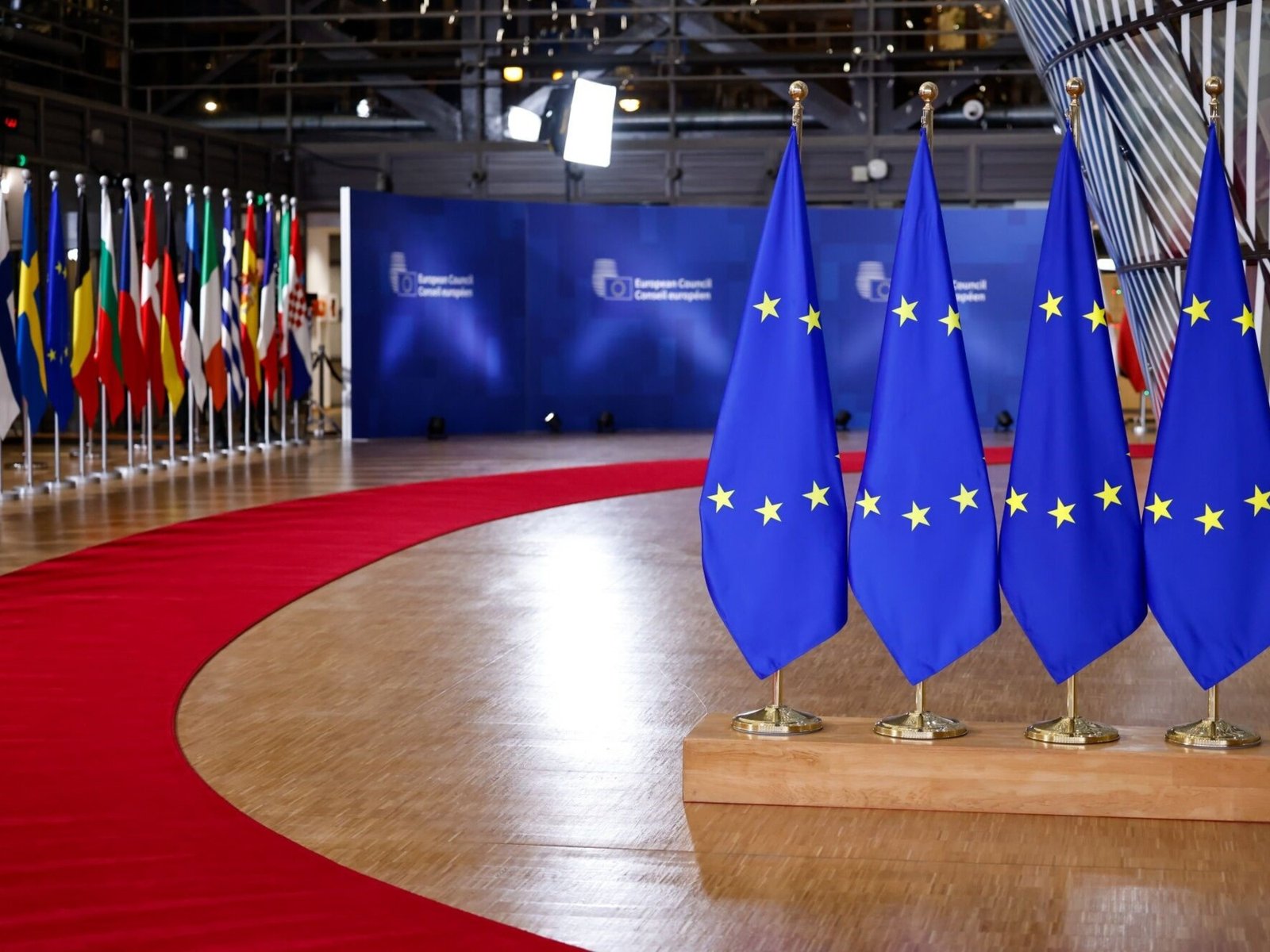
Como anunciaba meses atrás la Comisión Europea, el 2025 puede ser el año del acuerdo entre el Mercosur y la Unión Europea.
Casi 25 años después de las primeras negociaciones, la cumbre europea de este jueves emitió un atisbo de fumata blanca. Tras la reunión, el jefe del gobierno alemán, el democristiano Friedrich Merz, aseguró por sorpresa que los 27 dirigentes habían hecho un voto informal sobre el acuerdo y que el resultado había sido unánime a favor de una rápida ratificación.
En los últimos meses la Comisión Europea sopesó presentar el texto a los ministros de Comercio. Francia se resistía a aprobarlo, pero las semanas fueron pasando y en verano quedó claro que París iba a tener muy difícil reunir los votos necesarios para lograr una minoría de bloqueo.
La diplomacia española, que ha estado durante las dos últimas décadas apoyando el pacto sin importar quién gobernara en Madrid, no quiso echar las campanas al vuelo porque este jueves todavía veía resistencias.
También quiso frenar Antonio Costa, presidente del Consejo Europeo, el organismo que reúne a los jefes de Estado o de gobierno. El portugués, ex primer ministro, dijo que no se había votado. De hecho, los líderes no votan acuerdos comerciales, algo que queda para ministros o incluso embajadores.
Costa dijo en conferencia de prensa que no hubo ni voto, pero sí que había “pedido a los líderes que dieran a sus embajadores la orden de resolver los problemas técnicos que quedan en las traducciones para que se pueda firmar a tiempo”.
Pero las declaraciones de Merz, que respaldaron diplomáticos de varios países explicando que no había habido un voto formal sino una discusión en la que sí se mostró esa unanimidad a favor del pacto, muestran que las reticencias son menores y salvables.
El paso alemán, ya con todo a favor del acuerdo y con solo Francia, entre los grandes europeos, con reticencias, acelera el proceso. La cumbre cerró con el presidente francés Emmanuel Macron echando el freno y diciendo que no estaba todo cerrado, pero sin desmentir a Merz y asegurando que las cesiones hechas a los sectores agropecuarios europeos eran adecuadas.
Si los ministros votan en las próximas semanas (no tienen por qué ser los de Comercio, vale cualquier reunión de ministros europeos de cualquier ramo) y el texto sale adelante, el Parlamento Europeo podría tener que ratificarlo antes de finales de año y se abre la fecha del 19 de diciembre para su ratificación definitiva, tras casi 25 años.
Javi López, vicepresidente del Parlamento Europeo, de la familia socialdemócrata catalana, aseguró a Clarín que, aunque justa, la votación saldría adelante por una ventaja de entre 30 y 50 votos (la Cámara tiene 705). Es la misma diferencia que permitió hace un año revalidar en su cargo a Úrsula Von der Leyen, presidenta de la Comisión Europea.
La firma podrían hacerla incluso los embajadores de los 27 ante la Unión Europea, bajando incluso así un poco más el peso político de la decisión, y de paso sacándola también de las tapas de los medios.
Fuentes diplomáticas de tres países del bloque, dos favorables al acuerdo y uno contrario, aseguraron estos días a Clarín que sí está todo hecho, pero que Macron (y algunos primeros ministros de países menores donde el acuerdo sigue viéndose como un peligro para sus sectores agropecuarios) necesita un poco más de tiempo para vender el acuerdo a su clase política.
Mercosur sigue siendo una de las niñas de los ojos bonitos de los europeos, sobre todo tras el advenimiento de la segunda administración Trump y su guerra arancelaria. El acuerdo entre la Unión Europea y el Mercosur sería el mayor acuerdo comercial del planeta por el volumen de intercambios y por la población que reúnen los dos bloques.
Europa sabe que llega tarde, pero aún quiere fijar sus banderas en los países del Mercosur, porque se juega decenas de miles de millones de euros en inversiones y porque China le ha ido comiendo partes de ese mercado en las últimas dos décadas.
Precisamente contra China se van endureciendo los europeos. Si China no estaba oficialmente entre los debates de esta cumbre, sí lo estuvo en las reuniones y en las declaraciones finales.
Hay dudas sobre cómo reaccionar ante una China que impone ahora restricciones a la exportación de tierras raras que la industria europea necesita como el aire. Por eso el propio Macron pidió el jueves que la Comisión Europea utilice por primera vez el mecanismo que llama “instrumento anti-coerción” si China no cede y realmente bloquea esas exportaciones.
INTERNACIONAL
NATO fighter jets scrambled after Russian planes allegedly violate airspace
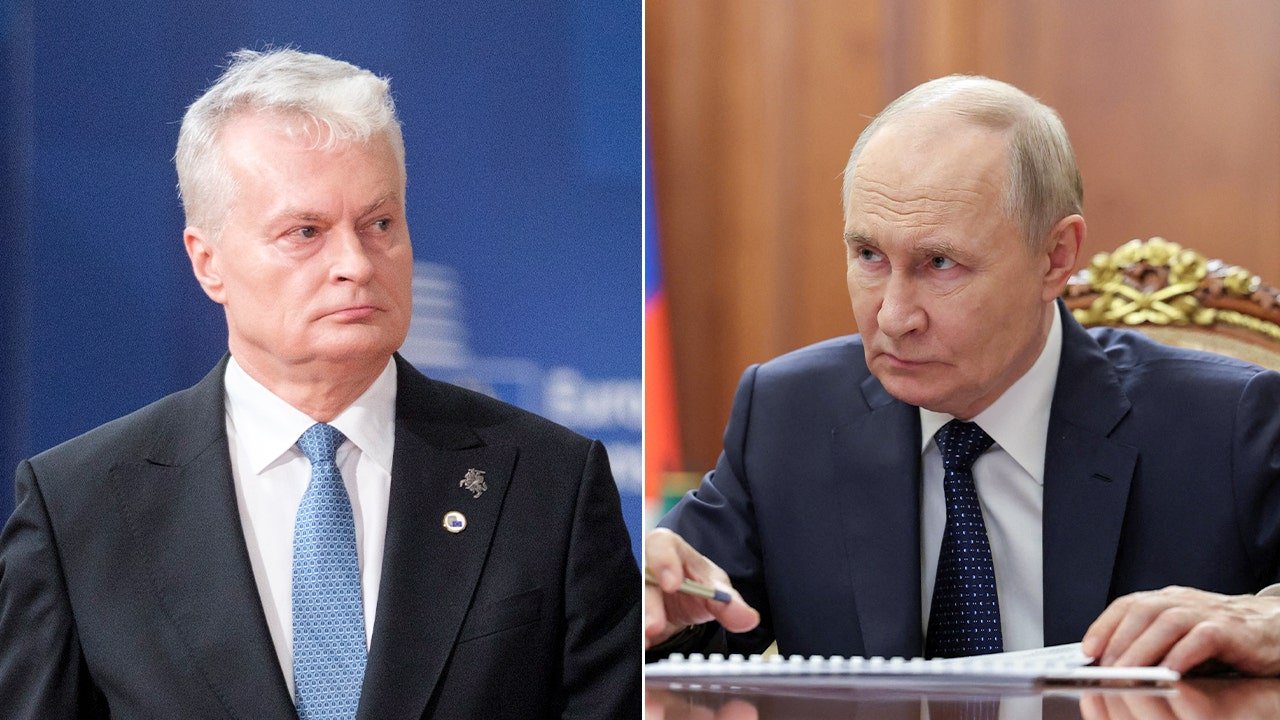
NEWYou can now listen to Fox News articles!
Two Spanish fighter jets were scrambled while on NATO air policing missions after Russian aircraft violated Lithuanian airspace.
The Lithuanian armed forces said that at approximately 6:00 p.m. local time on Thursday, two Russian aircraft — an SU-30 and an IL-78 — flew about 765 yards into Lithuanian airspace, The Associated Press reported. The aircraft allegedly flew away after approximately 18 seconds.
«This evening, Russian military planes violated Lithuanian airspace. This is a blatant breach of international law and territorial integrity of Lithuania. Once again, it confirms the importance of strengthening European air defense readiness,» Lithuanian President Gitanas Nausėda posted on X.
NATO WARNS RUSSIA AFTER POLAND SHOOTS DOWN ‘HUGE NUMBER’ OF DRONES THAT VIOLATED ITS AIRSPACE
Lithuania accused Russia of violating its airspace, leading to the scrambling of two jets on a NATO mission. (Thierry Monasse/Getty Images; Sputnik/Alexander Kazakov/Pool via Reuters)
Nausėda announced that the Lithuanian Ministry of Foreign Affairs would summon representatives from the Russian embassy in Vilnius «to protest against reckless and dangerous behavior.» The ministry later confirmed on X that the Russian charge d‘affaires was summoned in protest of the airspace violation.
«Russia must cease its aggressive behavior, respect international law and the borders of neighboring states,» the ministry said in a post on X.
Russia’s defense ministry denied Lithuania’s claim, saying that SU-30 fighter jets were conducting training flights over the Kaliningrad region in strict compliance with the rules, the AP reported.
«The aircraft did not deviate from their flight route or violate the borders of other states, as confirmed by objective monitoring means,» the ministry said, according to the AP.

Russian President Vladimir Putin holds his annual end-of-year press conference in Moscow on Dec. 19, 2024. (Alexander Nemenov/AFP via Getty Images)
RUSSIAN JETS CARRYING BALLISTIC MISSILES VIOLATE ESTONIAN AIRSPACE, FOREIGN MINISTER SAYS
Baltic nations have been on heightened alert amid Russia’s ongoing war with Ukraine, according to the AP. The outlet added that the recent airspace incursions have fueled fears that Russian President Vladimir Putin could be testing NATO, though Moscow has denied this.
Poland, Denmark and Romania, which are all NATO member states, reported airspace violations by Russian drones in the last few months. In August, Romania was forced to scramble F-16 jets after Russia carried out a strike just half a mile from its territory as U.S. Special Envoy Steve Witkoff met with Putin ahead of the Kremlin leader’s Alaska summit with President Donald Trump.
Earlier this week, Trump called off a meeting with Putin that was set to take place in Budapest, Hungary. While the White House did not rule out the possibility of a future summit, Trump has criticized Putin for his lack of action to move toward peace with Ukraine.
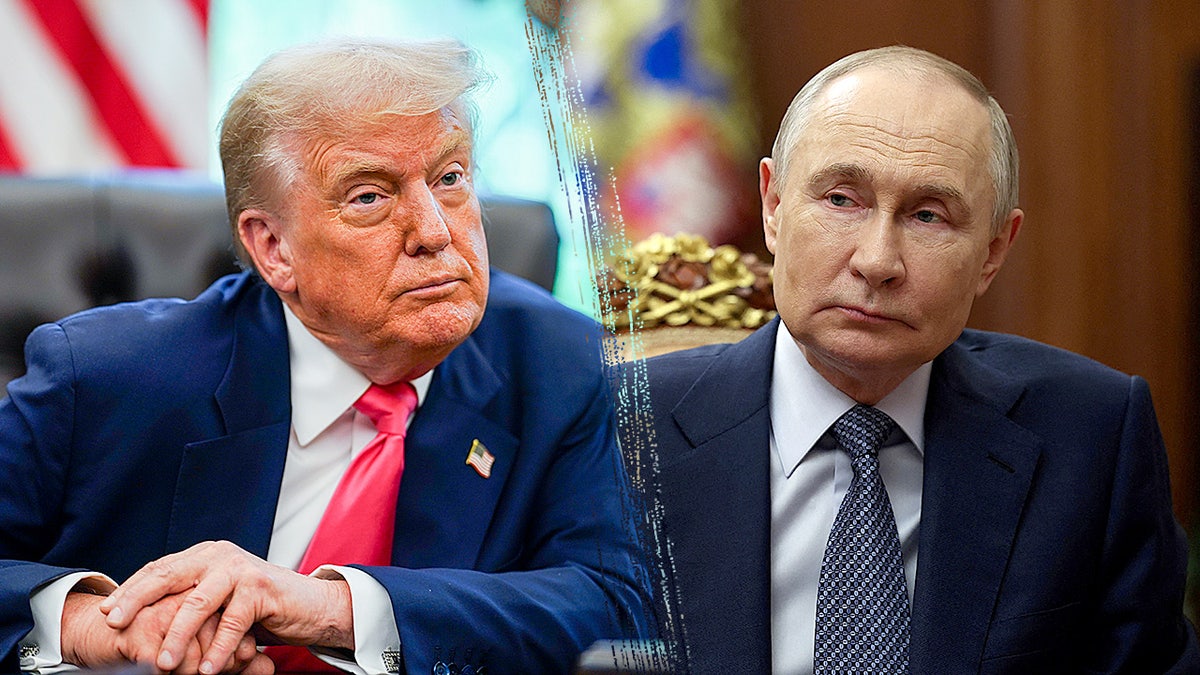
President Donald Trump canceled a summit with Russian leader Vladimir Putin. (Getty Images)
Trump «feels as though, unfortunately, from the Russian side as of late, he has not seen enough interest in enough action in terms of moving the ball forward toward peace,» White House press secretary Karoline Leavitt told reporters Thursday.
«And so a meeting between these two leaders is not completely off the table. I think the president and the entire administration hope that one day that can happen again, but we want to make sure that there’s a tangible positive outcome out of that meeting, and that it’s a good use of the president’s time,» she added.
While sitting with NATO Secretary-General Mark Rutte in the Oval Office, Trump told reporters that the meeting was canceled and that «it didn’t feel right» to him.
CLICK HERE TO DOWNLOAD THE FOX NEWS APP
«It just didn’t feel right to me,» Trump said Wednesday. «It didn’t feel like we were going to get to the place we have to get, so I canceled it, but we’ll do it in the future.»
No plans for a future meeting have been announced since the cancellation of the summit in Hungary.
Fox News Digital’s Diana Stancy contributed to this report.
nato,europe,russia,ukraine,vladimir putin

 CHIMENTOS3 días ago
CHIMENTOS3 días agoAdabel Guerrero confesó de qué famosa está enamorada y que le encantaría tener relaciones: «La China Suárez me sorprendió con su belleza»

 DEPORTE2 días ago
DEPORTE2 días agoUniversidad de Chile vs. Lanús, por la Copa Sudamericana: día, horario y cómo verlo por TV

 POLITICA2 días ago
POLITICA2 días agoDiego Luciani, sobre la condena a Cristina Kirchner: “No hay sentencia ejemplar sin recuperar lo robado”











